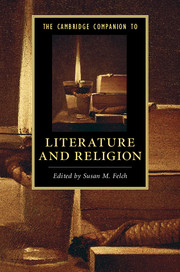Book contents
- Frontmatter
- Epigraph
- Contents
- Notes on Contributors
- Chronology of Religious Founders and Texts
- Introduction
- PART I READING PRACTICES
- PART II INTERSECTIONS
- PART III TRADITIONS
- 9 Hinduism
- 10 Buddhism
- 11 Judaism
- 12 Eastern Orthodoxy
- 13 Roman Catholicism
- 14 Islam
- 15 Protestantism
- 16 World Christianity
- Select Bibliography
- Index
- Miscellaneous Endmatter
16 - World Christianity
from PART III - TRADITIONS
Published online by Cambridge University Press: 05 September 2016
- Frontmatter
- Epigraph
- Contents
- Notes on Contributors
- Chronology of Religious Founders and Texts
- Introduction
- PART I READING PRACTICES
- PART II INTERSECTIONS
- PART III TRADITIONS
- 9 Hinduism
- 10 Buddhism
- 11 Judaism
- 12 Eastern Orthodoxy
- 13 Roman Catholicism
- 14 Islam
- 15 Protestantism
- 16 World Christianity
- Select Bibliography
- Index
- Miscellaneous Endmatter
Summary
Despite the historical myopia that associates Christianity solely with European Christendom, Christianity was a world religion from its very founding. Originating with a small group of Jewish men and women living in radically new egalitarian ways under Roman rule, Christianity rapidly spread in the first-century world, as St. Paul and others founded Christian communities throughout the Mediterranean Roman Empire. By the third century Christianity had made its way to Armenia, a distant Roman province in Western Asia, where, for the first time in history, it was named an official state religion. Constantine's Edict of Milan (A.D. 313) assuring religious freedom for Christians prompted more conversions in Spain, Italy, the Balkans, and North Africa. Traders and missionaries brought Christianity to areas as distant as the British Isles, Persia, China, and Ethiopia, where Christianity was made a state religion in A.D. 330. But northern Germany, central Europe, and Scandinavia did not embrace Christianity until between the fifth and tenth centuries. Subsequent eras of exploration and colonialism from the seventeenth to the nineteenth century eventually brought Christianity to North America, Central and South America, and the rest of Africa and Asia.
Yet demographers and religious historians today speak of “World” or “Global” Christianity in terms of the explosive twentieth-century growth of Christianity in the “Global South” of Africa, Asia, and Latin America concomitant with its waning presence in North America and Europe. In 2010, according to the Pew Forum on Religion and Public Life, 61 percent of Christians lived in the Global South, compared with about 39 percent in the Global North. This represented a sweeping change: in 1910, about two-thirds of the world's Christians lived in Europe, but by 2010, only about 26 percent of all Christians lived in Europe, the former center of Christianity for over one thousand years. World Christianity today spans multiple continents, theological traditions, nationalities, ethnicities, and cultures.
World Christianity, in both its historical and current manifestations, begins with the premise that Christianity is not exclusively a Western religion. As African religious historian Lamin Sanneh explains, World Christianity denotes indigenous peoples’ discovery of Christianity rather than their capitulation to European Christianity. World Christianity assumes that because humans are linguistic, cultural, and social entities, they can apprehend and articulate Christian faith only within a particular historical context.
- Type
- Chapter
- Information
- The Cambridge Companion to Literature and Religion , pp. 262 - 276Publisher: Cambridge University PressPrint publication year: 2016
- 2
- Cited by

